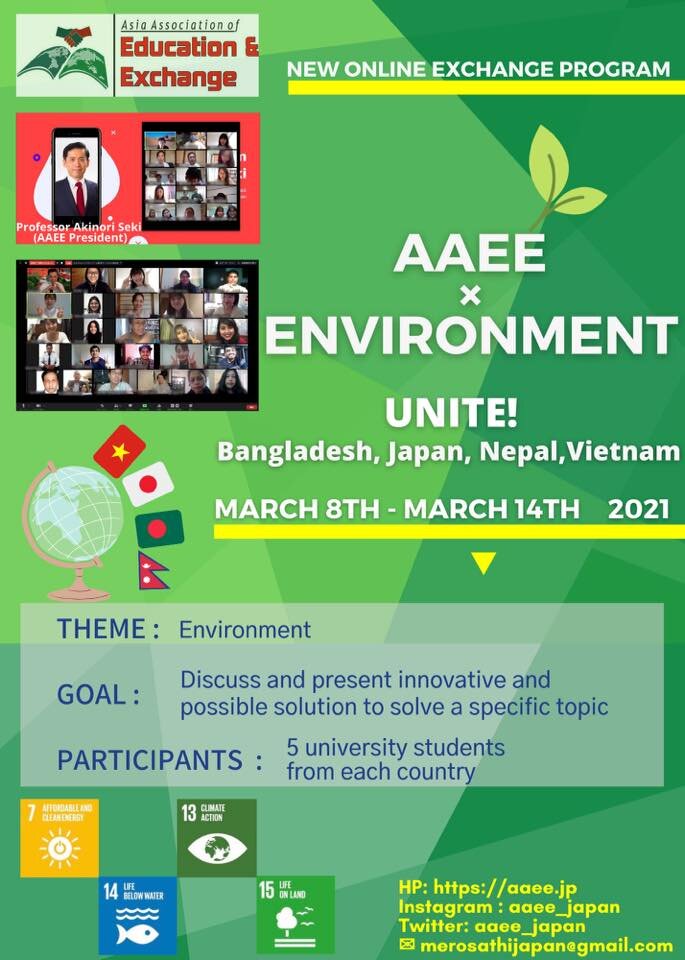

Mar, 2021
From Monday, March 8, 2021 to Friday, March 14, 2021, AAEE (Asian Educational Research Organization) hosted "AAEE x Environment ~UNITE ! Bangladesh, Japan, Nepal, Vietnam ~" hosted by AAEE (Asian Educational Research Organization). This program is the AAEE's first and the world's first joint international exchange program for students from Bangladesh, Japan, Nepal, and Vietnam.
The 20 students from the four countries engaged in heated discussions on the theme of "environment" for seven days, and on the last day, each group explained the significance of their chosen environmental problem and presented concrete solutions via live streaming.
Before the program, we had a pre-program ice breaker to deepen our friendship, and then asked the participants to watch a movie about environmental issues and discuss their impressions and opinions after watching the movie.
On the second day, we invited a doctoral student from the Sophia University Graduate School of Science and Technology to talk about environmental issues in the context of the current situation in the four countries. On the third and fourth days, the students were divided into five element groups (fire, water, soil, air, and living organisms) to research the current status of environmental problems in each country and discuss concrete solutions in preparation for their presentations on the final day of the event. On the fifth and sixth days, each group presented once as a rehearsal for their final presentations and received feedback from the student assistants. On the fifth and sixth day, each group presented once as a rehearsal for the final presentation and received feedback from the student assistants, and then worked again to make it better with their excellent research and creativity. On the final day, Mr. Hiroaki Kuwajima, currently a visiting scholar at the Institute of Japanese Studies, University of California, Berkeley, and an executive research fellow at the Haas School of Business, and Mr. Akinori Seki, president of the University of California, Berkeley, were invited as judges. The five groups' solutions to environmental problems were broadcast live to the world via YouTube and Facebook. The video has been viewed more than 500 times and has been featured in newspapers in Bangladesh.
https://bangladeshpost.net/posts/bangladeshi-students-offer-environmental-solutions-at-international-summit-on-sdgs-55904?fbclid= IwAR1DQ-8A2lzFS5huib0ybdnA-W0Xu8OZfxYNa535TdmYl-hetdoAGNdD3lo
Comments from Participants
[Thoughts during the research
I have never had any professional experience in learning about the environment. Therefore, I found it difficult that my lack of knowledge limited the breadth and depth of my thoughts and discussions. However, in response to the global issue of environmental problems, students with different backgrounds were able to advance their research by collaborating in a complementary manner, utilizing their own expertise and perspectives.
I believe that we were able to deepen our learning by focusing on devising solutions rather than just discussing them. I was able to receive constructive feedback on the solutions I proposed, and I learned important perspectives in the conceptualization of the process of putting the vision into practice, such as how to raise people's awareness and what incentives to use for behavioral change, and how to ensure scalability and sustainability. This was a valuable experience for me.
Impressions from the entire program
What I felt most strongly throughout the program was that there were fewer conversations using the country name as the subject compared to my experience in the bilateral international exchange program.
In the case of a two-country program, it is easy to have conversations and exchanges about the respective countries, and it is easy to deepen mutual understanding of the countries, so it is easy to build relationships with individuals who have that background, even through academic content.
On the other hand, in the case of exchange between four countries, it is easy to create a situation where there is no one else who shares the same nationality and culture as you, for example, the research activity, which was the main activity of this program, was conducted in a group of four people, one from each country. In this case, while mutual understanding among the four countries, including one's own country, takes time, individuals are freed from nationality and culture to a certain extent, and it is easy to have conversations in which one's own name is the subject. Through the multinational exchange, I felt the possibility of looking at countries and cultures from the perspective of individuals and subjects.
In addition, I recognized the importance of multilayered sharing and solidarity, such as sharing within each country's team, just as the Japanese team held daily review meetings.
I would like to express my sincere gratitude for the opportunity to think about international exchange in such an online environment.
This was the AAEE's first program to be held in four countries simultaneously, and the cooperation between students from the four countries was made possible by their acceptance of each other's values and culture from the time the program was created. Despite being from different cultures, values, and environments, they were able to connect with each other through a single computer, and I could feel their true passion and seriousness. I have great expectations for their future activities.
